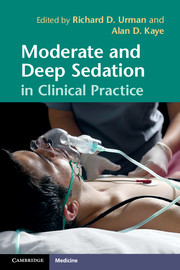Book contents
- Moderate and Deep Sedation in Clinical Practice
- Moderate and Deep Sedation in Clinical Practice
- Copyright page
- Dedication
- Contents
- Contributors
- Foreword
- Preface
- Guidelines and standards
- Chapter 1 Introduction to moderate and deep sedation
- Chapter 2 Pharmacology principles
- Chapter 3 Pain assessment and management considerations
- Chapter 4 Patient evaluation and procedure selection
- Chapter 5 Patient monitoring, equipment, and intravenous fluids
- Chapter 6 Credentialing, competency, and education
- Chapter 7 Quality, legal, and risk management considerations: ensuring program excellence
- Chapter 8 Nursing considerations for sedation
- Chapter 9 Physician assistants and nurse practitioners
- Chapter 10 High-risk patients: sedation considerations in coexisting disease
- Chapter 11 Management of complications of moderate and deep sedation
- Chapter 12 Outcomes, controversies, and future trends
- Chapter 13 Simulation training for sedation
- Chapter 14 Sedation in the radiology suite
- Chapter 15 Sedation in the endoscopy suite
- Chapter 16 Sedation in the interventional cardiology suite
- Chapter 17 Sedation in the emergency department
- Chapter 18 Sedation in the intensive care setting
- Chapter19 Pediatric sedation
- Chapter 20 Sedation in the office/outpatient setting
- Chapter 21 Sedation in dentistry
- Chapter 22 Sedation for assisted reproductive technologies
- Chapter 23 Sedation for interventional pain management procedures
- Chapter 24 Emergency resuscitation algorithms: adults
- Chapter 25 Emergency resuscitation algorithms: infants and children
- Index
Chapter 22 - Sedation for assisted reproductive technologies
Published online by Cambridge University Press: 05 March 2012
- Moderate and Deep Sedation in Clinical Practice
- Moderate and Deep Sedation in Clinical Practice
- Copyright page
- Dedication
- Contents
- Contributors
- Foreword
- Preface
- Guidelines and standards
- Chapter 1 Introduction to moderate and deep sedation
- Chapter 2 Pharmacology principles
- Chapter 3 Pain assessment and management considerations
- Chapter 4 Patient evaluation and procedure selection
- Chapter 5 Patient monitoring, equipment, and intravenous fluids
- Chapter 6 Credentialing, competency, and education
- Chapter 7 Quality, legal, and risk management considerations: ensuring program excellence
- Chapter 8 Nursing considerations for sedation
- Chapter 9 Physician assistants and nurse practitioners
- Chapter 10 High-risk patients: sedation considerations in coexisting disease
- Chapter 11 Management of complications of moderate and deep sedation
- Chapter 12 Outcomes, controversies, and future trends
- Chapter 13 Simulation training for sedation
- Chapter 14 Sedation in the radiology suite
- Chapter 15 Sedation in the endoscopy suite
- Chapter 16 Sedation in the interventional cardiology suite
- Chapter 17 Sedation in the emergency department
- Chapter 18 Sedation in the intensive care setting
- Chapter19 Pediatric sedation
- Chapter 20 Sedation in the office/outpatient setting
- Chapter 21 Sedation in dentistry
- Chapter 22 Sedation for assisted reproductive technologies
- Chapter 23 Sedation for interventional pain management procedures
- Chapter 24 Emergency resuscitation algorithms: adults
- Chapter 25 Emergency resuscitation algorithms: infants and children
- Index
Summary
Keywords
Information
- Type
- Chapter
- Information
- Moderate and Deep Sedation in Clinical Practice , pp. 281 - 290Publisher: Cambridge University PressPrint publication year: 2012
